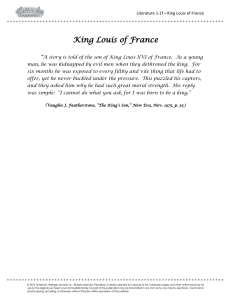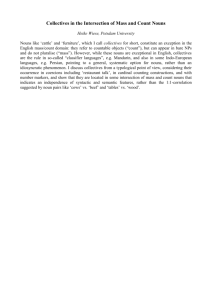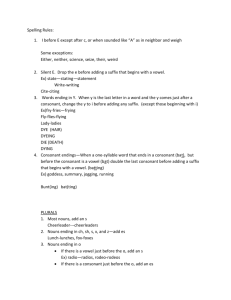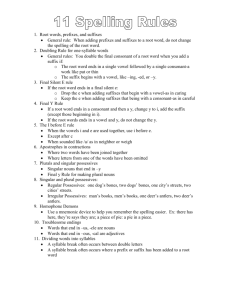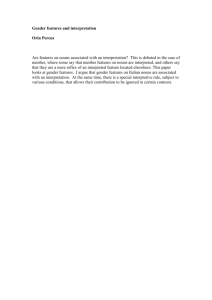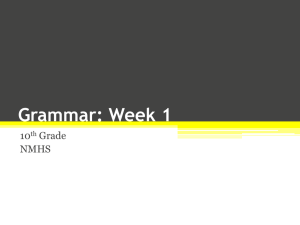A, AN & THE
advertisement
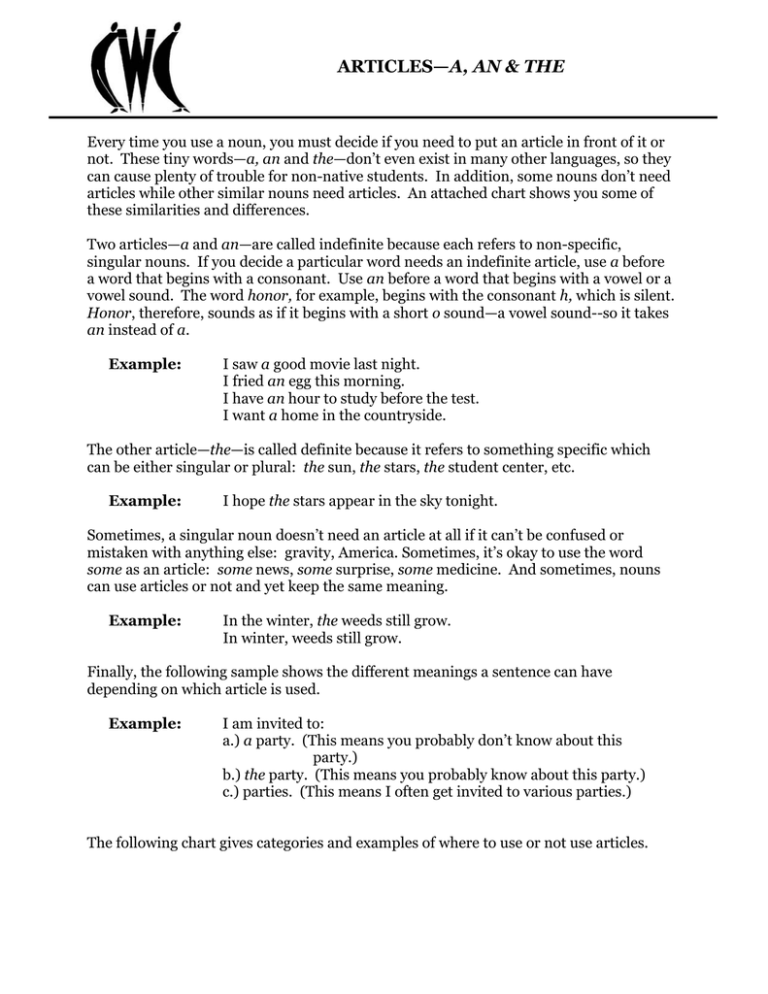
ARTICLES—A, AN & THE Every time you use a noun, you must decide if you need to put an article in front of it or not. These tiny words—a, an and the—don’t even exist in many other languages, so they can cause plenty of trouble for non-native students. In addition, some nouns don’t need articles while other similar nouns need articles. An attached chart shows you some of these similarities and differences. Two articles—a and an—are called indefinite because each refers to non-specific, singular nouns. If you decide a particular word needs an indefinite article, use a before a word that begins with a consonant. Use an before a word that begins with a vowel or a vowel sound. The word honor, for example, begins with the consonant h, which is silent. Honor, therefore, sounds as if it begins with a short o sound—a vowel sound--so it takes an instead of a. Example: I saw a good movie last night. I fried an egg this morning. I have an hour to study before the test. I want a home in the countryside. The other article—the—is called definite because it refers to something specific which can be either singular or plural: the sun, the stars, the student center, etc. Example: I hope the stars appear in the sky tonight. Sometimes, a singular noun doesn’t need an article at all if it can’t be confused or mistaken with anything else: gravity, America. Sometimes, it’s okay to use the word some as an article: some news, some surprise, some medicine. And sometimes, nouns can use articles or not and yet keep the same meaning. Example: In the winter, the weeds still grow. In winter, weeds still grow. Finally, the following sample shows the different meanings a sentence can have depending on which article is used. Example: I am invited to: a.) a party. (This means you probably don’t know about this party.) b.) the party. (This means you probably know about this party.) c.) parties. (This means I often get invited to various parties.) The following chart gives categories and examples of where to use or not use articles. Don’t Use an Article Use an Article Personal names: Jean Smith Title and name: Prince Charles Archbishop Rigali President Bush Cities, states, countries, continents or individual islands: St. Louis Missouri Vietnam South America Jamaica Individual mountains: Mount Ranier Mount Everest Individual lakes: Lake Michigan Beaches: A family as a group: the Smiths Title without the name: the Prince of Wales the Archbishop of St. Louis the President of the U. S. Collectives, plural place names or groups of islands: the United States of America the United Arab Emirates the Dominican Republic the Philippines the Bahamas Mountain ranges: the Cascade Mountains the Himalayas Collectives or groups of lakes: the Great Lakes Rivers, oceans, seas and canals: the Mississippi River the Pacific Ocean the Mediterranean Sea the Suez Canal Unique geographic places: the Arctic Circle the South Pole the Sahara Desert Ships, trains and aircraft: the Titanic the Orient Express the Spirit of St. Louis Place or geographic names which follow the pattern “the______of_________:” the District of Columbia the Gulf of Mexico the Strait of Hormuz Major roads with descriptive names: the Pennsylvania Turnpike the Northwest Tollway the Innerbelt Regions or areas: the Pacific Northwest the South Pacific the East Coast the Middle East Daytona Beach Mission Beach Parks: Forest Park Yellowstone Spacecraft: Challenger Sputnik Streets, roads and avenues: Olive Street Manchester Road Highway 170 Directions: north, northwest, northeast south, southwest, southeast, east, west Don’t Use an Article Use an Article Name+College or University: St. Louis Community College Washington University School subjects: history math Languages: German English Games and sports: chess soccer Places showing an activity happens there: class work bed home college Holidays: Labor Day New Year’s Day Months and days: August Tuesday Magazines: Newsweek People Diseases (chronic or long-term illness): kidney failure AIDS cancer Meals in a general sense: Everyone should eat breakfast. I have to cook dinner tonight. What’s for lunch? the University/College of+name: the University of Missouri the College of the Ozarks School departments: the History Department the Math Department the __________language: the German language the English language Musical instruments: the saxophone the piano Exceptions: the university the hospital (British English, however, doesn’t use the article with these two words.) Holiday exceptions: the Fourth of July the Feast of Epiphany Months and days (spelled out): the month of August the first Tuesday of the month Newspapers: the St. Louis Post Dispatch the Riverfront Times Temporary illness: a cold the flu a sprained ankle Specific meals: I ate a big breakfast. He cooked a good dinner. The lunch they fixed smells good. A group of people with a common characteristic, in which the adjective describes the group: the French the poor Adapted from: Elbaum, Sandra. Grammar in Context, Book 3. Boston: Heinle & Heinle Publishers, 1996. Revised 2004 at Meramec
